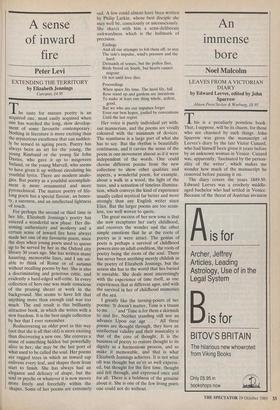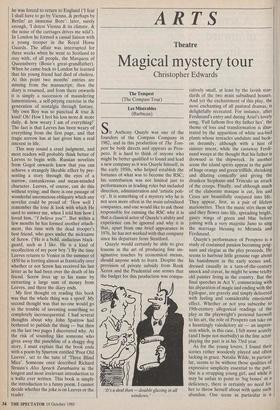An immense bore
Noel Malcolm
LEAVES FROM A VICTORIAN DIARY by Edward Leeves, edited by John Sparrow
Alison Press/Secker & Warburg, £8.95
This is a peculiarly pointless book. That, I suppose, will be its charm, for those who are charmed by such things. John Sparrow was given the manuscript of Leeves's diary by the late Victor Cunard, who had himself been given it years before by an unknown woman in Venice. Cunard was, apparently, 'fascinated by the person- ality of the writer', which makes me wonder how much of the manuscript he removed before passing it on.
The diary covers the years 1849-50. Edward Leeves was a crochety middle- aged bachelor who had settled in Venice. Because of the threat of Austrian invasion he was forced to return to England ('I fear I shall have to go by Vienna, & perhaps by Berlin! an immense Bore': later, surely enough, 'I detest Vienna & its climate, & the noise of the carriages drives me wild'). In London he formed a casual liaison with a young trooper in the Royal Horse Guards. The affair was interrupted for three weeks when he went to Scotland to stay with, of all people, the Marquess of Queensberry (Bosie's great-grandfather). When he came back to London he learned that his young friend had died of cholera. At this point two months' entries are missing from the manuscript; then the diary is resumed, and from there onwards it is simply a succession of maundering lamentations, a self-pitying exercise in the generation of nostalgia through fantasy. 'My own Boy was so punctual & true & kind! Oh! How I feel his loss more & more daily, & how weary I am of everything!' The fact is that Leeves has been weary of everything from the first page, and that tragic sorrow has at last given him a real interest in life.
This may sound a cruel judgment, and most readers will probably think better of Leeves to begin with. Russian novelists from Gogol onwards knew that you can achieve a strangely likeable effect by pre- senting a story through the eyes of a narrow, cantankerous and mean-minded character. Leeves, of course, can do this without trying; and there is one passage of wonderful unconscious obliquity which any novelist could be proud of: 'How well I remember the tone & look with which He used to answer me, when I told him how I loved him, "I believe you"'. But within a few months he has formed another attach- ment, this time with the dead trooper's best friend, who goes under the nickname of Screw. ('He is a bold, audacious black- guard, such as I like. He is a kind of recollection of my poor boy.') By the time Leeves returns to Venice in the summer of 1850 he is fretting almost as frantically over whether or not Screw has received his last letter as he had been over the death of his friend. Screw lives up to his name by extracting a large sum of money from Leeves, and there the diary ends.
My first thought on reading this book was that the whole thing was a spoof. My second thought was that no-one would go to the trouble of inventing something so completely inconsequential. I had several thoughts about why John Sparrow had bothered to publish the thing — but then on the last two pages I discovered why. At the risk of sounding like someone who gives away the punchline of a shaggy dog story, I must explain that the book ends with a poem by Sparrow entitled 'Poor Old Leeves', set to the tune of 'Three Blind Mice'. Someone once described Richard Strauss's Also Sprach Zarathustra as the longest and most irrelevant introduction to a waltz ever written. This book is simply the introduction to a funny poem. I cannot decide whether the joke is on Leeves or the reader.



















































 Previous page
Previous page